Third of a four part review of the Geneva Bible Part 1 Part 2
Study bibles do more than help the reader understand the Bible, they also shape the reader’s theology according to a particular faith tradition. This can be seen in the Geneva Bible and the Orthodox Study Bible. I will show this by laying out side by side their respective marginal comments on various topics: icons, justification by faith, Tradition, and the Eucharist.
I. Icons in Worship
Exodus 20:4
Geneva Bible — Thou shalt make thee no graven image, neither any similitude of things that are in heaven above, neither that are in the earth beneath, nor that are in the waters under the earth.
Note: None. No comment either for the parallel passage in Deuteronomy 5:9.
Orthodox Study Bible – You shall not make for yourself an idol or a likeness of anything in heaven above, or in the earth beneath, or in the waters under the earth.
Note: “An idol, or image, depicts some god as having a form or shape, but the true God has no form or shape. Why therefore did Israel use images in their worship? Because all these foreshadowed the Incarnation of the Son of God, whom we worship both as God and Man. Also, icons used in Church worship do not depict the divine nature. They draw attention to the Incarnation.”
Comparison: One contentious issue between Reformed Christians and the Orthodox has been the Orthodox use of icons (images) in worship. The bible passage often invoked by the iconoclasts is the Second Commandment; yet it is interesting to find the Geneva Bible silent on this important passage. The Orthodox Study Bible on the other hand places the Second Commandment in the broader context of Israelite worship versus pagan worship in a way that allows for the use of images without compromising biblical monotheism.
- II. Justification by Faith
Romans 5:1
Geneva Bible — Therefore being justified by faith, we have peace with God through our Lord Jesus Christ: . . . .
Note: “Another argument taken from the effects: we are justified with that which truly appeases our conscience before God: and faith in Christ does appease our conscience and not the law, as it was said before, therefore by faith we are justified, and not by the law.”
Orthodox Study Bible – Therefore, having been justified by faith, we have peace with God through our Lord Jesus Christ, . . . .
Note: “Faith in Christ makes us justified, an ongoing state of communion with Him (see note at 3:24. Because of this ongoing communion, we have peace with God which is also ongoing. The Greek word pistis, here translated as faith, can also be rendered “faithfulness.” Faith is more than the conviction that something is true (Jam 2:19). Genuine faithfulness is continuous loyalty and obedience to God. Such faithfulness justifies a person through God’s grace.” (Emphasis in original.)
Comparison: Sola fide (justification by faith alone) is the bedrock of the Protestant Reformation. What is striking about the Geneva Bible’s commentary is the subjective understanding of justification, i.e., bringing peace of mind to a guilty conscience, as opposed to an objective understanding of justification, i.e., repairing one’s relationship with God. The Orthodox Study Bible takes pain to make two points: (1) faith in Christ is more than intellectual but involves loyalty to Christ and (2) it is an ongoing relationship with God.
Ephesians 2:8-10
Geneva Bible — 8 For by h grace are ye saved through faith; and that not of yourselves: [it is] the gift of God: 9 Not of works, lest any man should boast. 10For we are i his workmanship, created in Christ Jesus unto good works, which God hath before ordained that we should walk in them.
Note: (h) “So then, grace, that is to say, the gift of God, and faith, stand with one another, to which two it is contrary to be saved by ourselves, or by our works. Therefore, what do those mean who would join together things of such contrary natures? (9) “He specifically and completely takes away from our works the praise of justification, seeing that the good works themselves are the effects of grace in us. (i) “He speaks here of grace, and not of nature: therefore if the works are ever so good, see what they are, and know that they are that way because of grace.”
Orthodox Study Bible – For by grace you have been saved through faith, and that not of yourselves; it is the gift of God, not of works, lest anyone should boast.
Note: “How can one get from the one kingdom to the other (vv. 1-7)? By the unity of grace, faith, and works (v. 9). Not that these are equal, for grace is uncreated and infinite, whereas our faith is limited and can grow; good works flow out of authentic faith. Works cannot earn us this great treasure—it is a pure gift—but those who receive this gift do good. We are not saved by good works, but for good works (v. 10).” (Emphasis in original)
Comparison: Where the Orthodox Study Bible emphasizes the unity of good works with faith and grace, the Geneva Bible emphasizes that good works can only be good because of grace. In its reaction to medieval Roman Catholicism Protestantism became allergic to the role of good works in salvation. Orthodoxy was not affected by this legalistic understanding of salvation. It does not see a tension between good works and salvation in Christ; the two are complementary to the other. The two marginal commentaries are not opposed to the other but one can sense in the Geneva Bible commentary a defensive tone with respect to good works.
III. Holy Tradition
I Corinthians 15:3
Geneva Bible — For first of all, I delivered unto you that which I received, how that Christ died for our sins, according to the Scriptures,
Note: None.
Orthodox Study Bible – For I delivered to you first of all that which I also received: that Christ died for our sins according to the Scriptures, . . . .
Note: “Paul delivered an apostolic tradition of Christ’s Resurrection which is unchanging and sufficient or salvation (v. 2). How had Paul received his gospel? By direct experience with the risen Lord (v. 8), confirmed by his interactions with the original apostles (Gal 2:2-10) and the whole Church. It is impossible to decipher what he learned where: in Paul’s mind his gospel forms a seamless whole. “To receive” designates the passing of tradition (see 11:2, 23; Gal 1:9; Php 4:9; 1 Th 2:13; 4:1`).” (Emphasis in original)
Comparison: The Geneva Bible had no comment on this verse. This gap represents a blind spot in the Protestant tradition. The Protestant understanding of capital “T” Tradition was likely shaped by the medieval Catholic version which by then had moved quite a bit from its patristic roots. The evolution of the medieval Catholicism led Protestants to view Tradition as a later addition alien to the New Testament writings. Eastern Orthodoxy, because it remained closer to its patristic roots, had a more balanced understanding of capital “T” Tradition viewing written and oral Apostolic Tradition as complementary to each other.
When I was a Protestant I would skip over certain words, not being aware of their exegetical or theological significance. Once I became alert to the language of the traditioning process: ‘deliver,’ ‘pass on,’ ‘received,’ ‘guard,’ my understanding of the biblical basis for Holy Tradition began to shift from the Protestant view to the Orthodox view. I began to see Tradition as something parallel to Scripture. See the “Biblical Basis for Holy Tradition.”
2 Thessalonians 2:15
Geneva Bible — Therefore, brethren, stand fast, and hold the traditions which ye have been taught, whether by word, or our epistle.
Note: “The conclusion: it remains then that we continue in the doctrine which was delivered to us by the mouth and writings of the apostles, through the free good will of God, who comforts us with an invincible hope, and that we also continue in all godliness our whole life long.”
Orthodox Study Bible — Therefore, brethren, stand fast and hold the traditions which you were taught, whether by word or our epistle.
Note: “Holy Tradition is that which Jesus taught to the apostles, and which they in turn taught the Church under the inspiration of the Holy Spirit in (a) their instructions as they visited the churches and (b) their writings. Under the guidance of the Holy Spirit we adhere to Holy Tradition as it is present in the apostles’ writings and as it is resident in the Church to which the truth is promised (Jn 1613).”
Comparison: This is a key passage because it is one of the few places where the Apostle Paul describes the relationship between oral and written tradition. This passage affirms the Orthodox understanding that Apostolic Tradition is expressed in both oral and written forms. Tradition is not the dead tradition of men but a living Tradition inspired by the Holy Spirit who works in the Church. The Geneva Bible commentary mostly repeats the text but does not delve into the deeper meaning of the passage.
2 Timothy 2:2
Geneva Bible — And the things that thou hast heard of me among a many witnesses, the same commit thou to faithful men, who shall be able to teach others also.
Note: “When many were there, who can bear witness of these things.”
Orthodox Study Bible — And the things that you have heard from me among many witnesses, commit these to faithful men who will be able to teach others also.
Note: “Paul establishes a clear chain of witnesses to oral tradition. Christian tradition is for all believers; it is “catholic,” belonging to the whole Church, and needs to be passed down to others unhindered. This stands in clear contrast to the elitism of the major religions of the first-century Roman world, including gnosticism and the various mystery religions.”
Comparison: This passage lays the biblical basis for apostolic succession. Timothy was not being ordained to the pastorate of a local church but rather to the office of bishop. He would be exercising apostolic authority as Paul’s successor. Timothy’s episcopal authority lay not so much in church ritual as in fidelity to the Apostolic Gospel. The presence of the many witnesses ensured that the message Timothy proclaimed was same as Paul’s. When one reads the Geneva commentary for this verse one is struck by the paucity of exegesis. This lacuna points to another blind spot in Reformed exegesis.
Jude 3
Geneva Bible — Beloved, when I gave all diligence to write unto you of the d common salvation, it was needful for me to write unto you, and exhort [you] that ye should e earnestly contend for the faith which was f once delivered unto the saints.
Note: (e) “That you should defend the faith with all the strength you can muster, both by true doctrine and good example of life. (f) Which was once given, that it may never be changed.”
Orthodox Study Bible – Beloved, while I was very diligent to write to you concerning our common salvation I found it necessary to write to you exhorting you to contend earnestly for the faith which was once for all delivered to the saints.
Note: “Jude had intended to write a more general letter on salvation but the danger of false teachers caused him to write a polemic instead. There is one salvation which is the same for all the elect, or common salvation. And this salvation is set in apostolic tradition once for all delivered to the saints; it cannot be changed.”
Comparison: One thing both the Geneva Bible and the Orthodox Study Bible are agreed on is that the Christian faith is fixed, it cannot be changed. The thinking that the Christian faith was relative or mutable is characteristic of ancient heresies like gnosticism or modern liberalism. The Gospel is not the result of personal discovery or creative insight but rather received through a line of apostolic succession.
IV. The Eucharist
Luke 22:20
Geneva Bible — Likewise also the cup after supper, saying, This g cup [is] h the new testament in my blood, which is shed for you.
Note: (g) “Here is a double use of metonymy: for first, the vessel is taken for that which is contained in the vessel, as the cup is spoken of for the wine which is within the cup. Second, the wine is called the covenant or testament, whereas in reality it is but the sign of the testament, or rather of the blood of Christ by which the testament was made: neither is it a vain sign, although it is not the same as the thing that it represents.”
Orthodox Study Bible – Likewise He also took the cup after supper, saying, “This cup is the new covenant in My blood, which is shed for you.
Note: “Gave thanks has at its root the Greek word eucharist, which immediately came to refer to both the Liturgy and the sacrament of Holy Communion. Before the end of the first century, a manuscript called the Didache refers to the celebration of the Liturgy as the “the Eucharist,” and in the year AD 150, St. Justin says of Holy Communion, “This food we call ‘Eucharist,’ of which no one is allowed to partake except one who believes that the things we teach are true, and has received the washing [holy baptism] for the forgiveness of sins and for rebirth, and who lives as Christ commanded us.” This is my body: The Orthodox Church has always accepted Christ’s words as true, “that the food consecrated by the word of prayer which comes from Him is the flesh and blood of that incarnate Jesus” (Justin).” (Emphasis in original)
Comparison: The Geneva Bible seeks to avoid the extremes of the Roman Catholic literal reading of the Words of Institution and the more symbolic understanding. The word “metonymy” is a literary device where the name of one thing is used as a reference for something else, e.g., “Lend me your ears!” One finds in the Geneva Bible commentary an ambivalent affirmation of the real presence. The Orthodox Church takes a more straightforward approach by affirming the real presence of Christ’s body and blood in the Eucharist. The Orthodox Study Bible points to an ancient witness of Justin Martyr who lived in the second century.
John 6:52-53
Geneva Bible — The Jews therefore strove among themselves, saying, How can this man give us [his] flesh to eat? Then Jesus said unto them, Verily, verily, I say unto you, Except ye eat the flesh of the Son of man, and drink his blood, ye have s no life in you.
Note: “Flesh cannot make a difference between fleshly eating, which is done by the help of the teeth, and spiritual eating, which consists in faith: and therefore it condemns that which it does not understand: yet nonetheless, the truth must be preached and taught.”
(v. 53) If Christ is present, life is present, but when Christ is absent, then death is present.”
Orthodox Study Bible – The Jews therefore quarreled among themselves, saying, “How can this Man give us His flesh to eat?” Then Jesus said to them, “Most assuredly, I say to you, unless you eat the flesh of the Son of Man and drink His blood, you have no life in you.”
Note: “We receive the grace of Christ’s sacrificial offering by coming to Him in faith (v. 35) and by receiving Holy Communion in faith. In Communion, we truly eat His flesh and drink His blood, and this grants the faithful eternal life (v. 54), with Christ abiding in us and us in Him (v. 56). ‘There is no room left for any doubt about the reality of His flesh and blood, because we have both the witness of His words and our won faith. Thus when we eat and drink these elements, we are in Christ and Christ is in us” (HilryP).’”
Comparison: The Geneva Bible commentary puts the focus on the Christian’s believing in Christ. The efficacy of the Lord’s Supper resides more in the Christian’s believing than in Christ’s actual presence in the Eucharist. The Orthodox Study Bible’s commentary affirms the importance both of the real presence and our having faith in Christ as the basis of the Eucharist.
Conclusion

Philip teaching the Ethiopian eunuch: Source
In Acts 8 we read of the Ethiopian eunuch who was reading the book of Isaiah all on his own with no commentary notes to assist him. So when Philip asked him if he understood what he was reading, he answered: “How can I, unless someone guides me?” (Acts 8:31)
There are some who believe that we do not need any external aids to understand the Bible that all we need to do is read the Bible carefully and logically and we will discover its true meaning. But as the experience of many people has shown, not to mention Scripture as well, we need someone to guide us in reading Scripture.
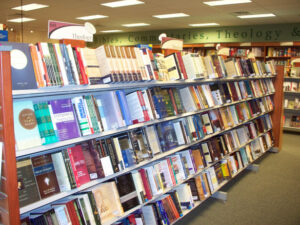 When one walks into a Christian bookstore one will see a plethora of study bibles: Geneva, Scofield, Ryrie, McArthur or whatever type you might want. Protestants instinctively know (like the Ethiopian eunuch above) they will need help in understanding what the Bible means. This brings to light an embarrassing fact that many Protestants are not ready to acknowledge openly: The words of Scripture by themselves are not enough; something more is needed. This something more is a faith tradition be it Reformed, Dispensationalist, Charismatic etc. Even those who make today’s study bibles relied on others before them.
When one walks into a Christian bookstore one will see a plethora of study bibles: Geneva, Scofield, Ryrie, McArthur or whatever type you might want. Protestants instinctively know (like the Ethiopian eunuch above) they will need help in understanding what the Bible means. This brings to light an embarrassing fact that many Protestants are not ready to acknowledge openly: The words of Scripture by themselves are not enough; something more is needed. This something more is a faith tradition be it Reformed, Dispensationalist, Charismatic etc. Even those who make today’s study bibles relied on others before them.
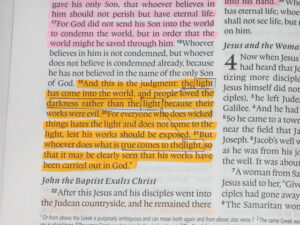 Protestants need to wake up to the fact that their understanding of Scripture is framed by a particular theological tradition. Certain Scripture passages are highlighted and others are passed over as being of lesser importance. One striking finding in our comparison is the Geneva Bible’s silence where Orthodoxy and the Reformed tradition diverge significantly, e.g., the Second Commandment (Exodus 20:4) and I Corinthians 15:3 which supports the notion of a traditioning process. These gaps in the Geneva Bible bring to light to blind spots in the Reformed tradition.
Protestants need to wake up to the fact that their understanding of Scripture is framed by a particular theological tradition. Certain Scripture passages are highlighted and others are passed over as being of lesser importance. One striking finding in our comparison is the Geneva Bible’s silence where Orthodoxy and the Reformed tradition diverge significantly, e.g., the Second Commandment (Exodus 20:4) and I Corinthians 15:3 which supports the notion of a traditioning process. These gaps in the Geneva Bible bring to light to blind spots in the Reformed tradition.
The Reformed tradition grounds its reading of Scripture on its supposed superior exegesis; the Orthodox tradition grounds its reading of Scripture on a tradition going back to the Apostles. It needs to be noted that the Reformed tradition was shaped by its rebellion against the Roman Catholic Church. This means that its exegetical tradition is not objective, nor grounded in apostolic Tradition, but influenced by its antagonism against Catholicism.
The real question then becomes: Whose particular theological tradition should we follow: one that started in the 1500s – or one that can trace its roots back to the first Apostles? This is the advantage of the Orthodox Study Bible and its commentary that draws on the wisdom of the early church fathers.
Robert Arakaki
Note
I visited two sites for this review. Studylight.org site is much more user friendly than BibleStudyTools.com site. Where StudyLight.org presented Scripture passage and commentary in distinct visual units, BibleStudyTools.com listed the commentary directly under the Scripture passage with no intervening space in between. This dense and compact visual style can be hard on the reader’s eyes after a while. Despite their shortcomings, the two websites are much easier on the eyes than hard copy the New England Puritans had. On a recent visit to the Graduate Theological Union library in Berkeley, CA, I checked out a hard copy version, and found myself straining to read the commentary notes which appeared to be in font size 8!
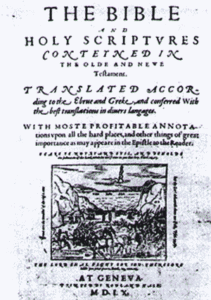
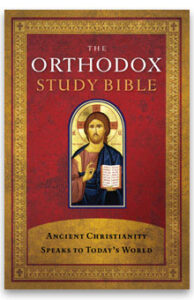
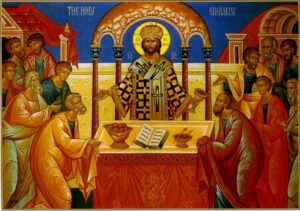
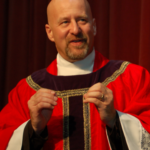


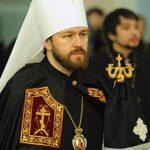

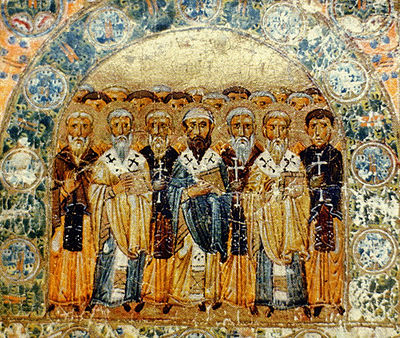
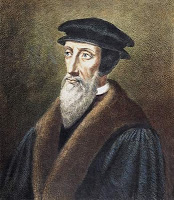
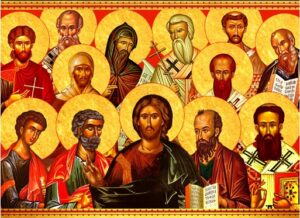
Recent Comments